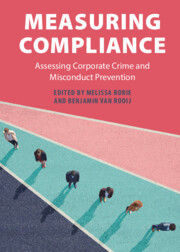Book contents
- Measuring Compliance
- Measuring Compliance
- Copyright page
- Contents
- Figures
- Tables
- Contributors
- 1 Measuring Compliance: The Challenges in Assessing and Understanding the Interaction between Law and Organizational Misconduct
- Part 1 The Compliance Industry, the State, and Measurement Needs
- Part 2 Quantitative Approaches to Measuring Corporate Compliance
- 5 Self-Report Surveys and Factorial Survey Experiments
- 6 The Use of Randomized Experiments for Assessing Corporate Compliance
- 7 Measuring Corporate Compliance: A Guide to Using Available Firm Data to Improve Employee Behavior
- 8 Measuring Compliance Risk and the Emergence of Analytics
- 9 Using Regulatory Inspection Data to Measure Environmental Compliance
- 10 Using Outcomes to Measure Aggregate-Level Compliance – Justifications, Challenges, and Practices
- Part 3 Qualitative Approaches to Measuring Corporate Compliance
- Part 4 Mixed Methods and Building on Existing Compliance Research
- Index
- References
6 - The Use of Randomized Experiments for Assessing Corporate Compliance
from Part 2 - Quantitative Approaches to Measuring Corporate Compliance
Published online by Cambridge University Press: 17 February 2022
- Measuring Compliance
- Measuring Compliance
- Copyright page
- Contents
- Figures
- Tables
- Contributors
- 1 Measuring Compliance: The Challenges in Assessing and Understanding the Interaction between Law and Organizational Misconduct
- Part 1 The Compliance Industry, the State, and Measurement Needs
- Part 2 Quantitative Approaches to Measuring Corporate Compliance
- 5 Self-Report Surveys and Factorial Survey Experiments
- 6 The Use of Randomized Experiments for Assessing Corporate Compliance
- 7 Measuring Corporate Compliance: A Guide to Using Available Firm Data to Improve Employee Behavior
- 8 Measuring Compliance Risk and the Emergence of Analytics
- 9 Using Regulatory Inspection Data to Measure Environmental Compliance
- 10 Using Outcomes to Measure Aggregate-Level Compliance – Justifications, Challenges, and Practices
- Part 3 Qualitative Approaches to Measuring Corporate Compliance
- Part 4 Mixed Methods and Building on Existing Compliance Research
- Index
- References
Summary
Abstract: This chapter reviews the utility of experimental methodology for compliance scholarship, describing various types of experiments and their benefits. Specifically, experiments are best suited for establishing the causal impact of a program or policy designed to impact compliance behavior – in other words, did that policy truly cause a change in behavior? With random assignment to “treatment” and “control” groups, researchers can be much more confident in their conclusions about program or policy effectiveness. However, there are limitations to experimental designs that must be considered as well.
- Type
- Chapter
- Information
- Measuring ComplianceAssessing Corporate Crime and Misconduct Prevention, pp. 108 - 119Publisher: Cambridge University PressPrint publication year: 2022



